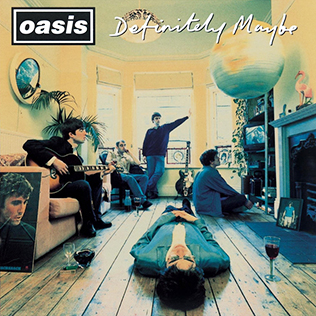
Definitely Maybe is the debut studio album by English rock band Oasis, released by Creation Records on 29 August 1994. The band booked Monnow Valley Studio near Rockfield in late 1993 to record the album and worked with producer Dave Batchelor, whom lead guitarist and chief songwriter Noel Gallagher knew from his time working as a roadie for the Inspiral Carpets, though sessions were unsatisfactory and Batchelor was subsequently fired.

Highway 61 Revisited is the sixth studio album by American singer-songwriter Bob Dylan, released on August 30, 1965, by Columbia Records. Dylan continued the musical approach of his previous album Bringing It All Back Home (1965), using rock musicians as his backing band on every track of the album in a further departure from his primarily acoustic folk sound, except for the closing track, the 11-minute ballad "Desolation Row". Critics have focused on the innovative way Dylan combined driving, blues-based music with the subtlety of poetry to create songs that captured the political and cultural chaos of contemporary America. Author Michael Gray has argued that, in an important sense, the 1960s "started" with this album.

My Generation is the debut studio album by English rock band the Who, released on 3 December 1965 by Brunswick Records in the United Kingdom, and Festival Records in Australia. In the United States, it was released on 25 April 1966 by Decca Records as The Who Sings My Generation, with a different cover and a slightly altered track listing. Besides the members of the Who, being Roger Daltrey (vocals), Pete Townshend (guitar), John Entwistle (bass) and Keith Moon (drums), the album features contributions by session musician Nicky Hopkins (piano).

Odelay is the fifth studio album by American musician Beck, released on June 18, 1996, by DGC Records. The album featured several successful singles, including "Where It's At", "Devils Haircut", and "The New Pollution", and peaked at number sixteen on the Billboard 200. As of July 2008, the album had sold 2.3 million copies in the United States, making Odelay Beck's most successful album to date. Since its release, the album has appeared in numerous publications' lists of the greatest of the 1990s and of all time.

Rage Against the Machine is the debut studio album by American rock band Rage Against the Machine. It was released on November 3, 1992, by Epic Records. The band released their first commercial demo tape of the same name 11 months prior to the album's release. The tape contained earlier recordings of 7 of the 10 songs featured on the album.

Electric Ladyland is the third and final studio album by the Jimi Hendrix Experience, released in October 1968. A double album, it was the only record from the Experience with production solely credited to Hendrix. The band's most commercially successful release and its only number one album, it was released by Reprise Records in the United States on October 16, 1968, and by Track Records in the UK nine days later. By mid-November, it had reached number 1 on the Billboard Top LPs chart, spending two weeks there. In the UK it peaked at number 6, where it spent 12 weeks on the British charts.
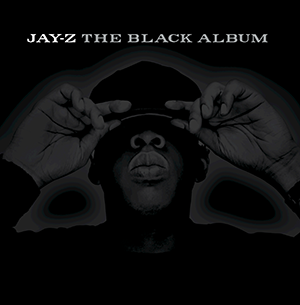
The Black Album is the eighth studio album by American rapper Jay-Z. It was released on November 14, 2003, through Roc-A-Fella Records and Def Jam Recordings. It was advertised as his final album before retiring, which is also a recurring theme throughout the songs, although Jay-Z resumed his recording career in 2005. For the album, Jay-Z wanted to enlist a different producer for each song, working with Just Blaze, Kanye West, the Neptunes, Eminem, DJ Quik, Timbaland, 9th Wonder and Rick Rubin, among others. The album also features a guest appearance by Pharrell Williams.

Document is the fifth studio album by American rock band R.E.M., released on August 31, 1987, by I.R.S. Records. It was the first album by the band to be produced by Scott Litt.

Tapestry is the second studio album by American singer-songwriter Carole King, released in 1971 on Ode Records and produced by Lou Adler. The lead singles from the album—"It's Too Late" and "I Feel the Earth Move"—spent five weeks at number one on both the Billboard Hot 100 and Easy Listening charts.

Polysics is a Japanese techno/electronic band from Tokyo, who dubs its unique style as "technicolor pogo punk". It was named after a brand of synthesizer, the Korg Polysix. The band started in 1997, but got their big break in 1998 at a concert in Tokyo. They create high energy music, fusing conventional guitar music with synthesized and computer generated sound to create a unique mixture of punk and synthpop heavily inspired by the American bands Devo and The Tubes, as well as Japanese bands such as P-Model and Yellow Magic Orchestra. Their song lyrics often consist of Japanese, English, or just downright gibberish. The band has been noted for their extremely energetic live performances and their wild gimmicky outfits, notably their straight-bar sunglasses and trademark orange boiler suits stamped with a simple "P".
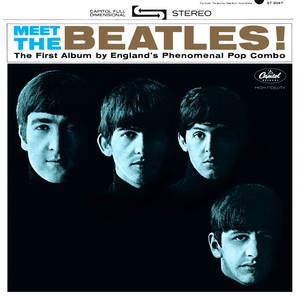
Meet the Beatles! is a studio album by the English rock band the Beatles, released as their second album in the United States. It was the group's first American album to be issued by Capitol Records, on 20 January 1964 in both mono and stereo formats. It topped the popular album chart on 15 February 1964 and remained at number one for eleven weeks before being replaced by The Beatles' Second Album. The cover featured Robert Freeman's iconic portrait of the Beatles used in the United Kingdom for With the Beatles, with a blue tint added to the original stark black-and-white photograph.

Greatest Hits is a compilation album by the American group Sly and the Family Stone. It was first released on November 21, 1970, by Epic Records. The album includes all of the singles from the albums Dance to the Music (1968), Life (1968), and Stand! (1969).
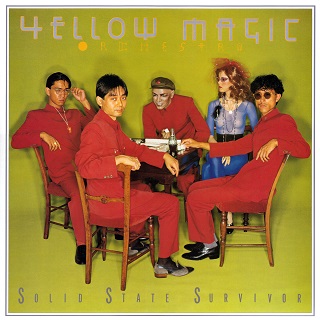
Solid State Survivor is the second album by Japanese electronic music band Yellow Magic Orchestra, released in 1979. Later, Solid State Survivor was released in 1982 in the UK on LP and cassette, also in 1992 in the United States on CD, but many of the songs from this album were compiled for release in the US as the US pressing of ×∞Multiplies (1980), including the tracks "Behind the Mask", "Rydeen", "Day Tripper", and "Technopolis". Solid State Survivor is only one of a handful of YMO albums in which the track titles do not have a Japanese equivalent.
"The 500 Greatest Albums of All Time" is a recurring opinion survey and music ranking of the finest albums in history, compiled by the American magazine Rolling Stone. It is based on weighted votes from selected musicians, critics, and industry figures. The first list was published in a special issue of the magazine in 2003 and a related book in 2005.

Brand New Knife is a 1997 album by the Japanese rock trio Shonen Knife. The Japanese version of this album contains six tracks with English lyrics and seven versions of the tracks with Japanese lyrics. The U.S. version features all 13 tracks in English, with the Japanese versions of the seven tracks featured as bonus tracks. In 2020, Jonathan McNamara of The Japan Times listed it as one of the 10 Japanese albums worthy of inclusion on Rolling Stone's 2020 list of the 500 greatest albums of all time.

Sol-fa is the second studio album by Japanese rock band Asian Kung-Fu Generation, released on October 20, 2004.
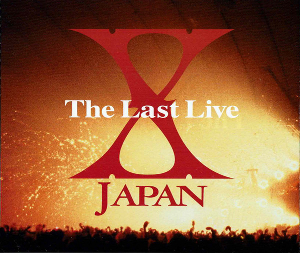
The Last Live is an X Japan live album released on May 5, 2001. It contains what was the band's last concert, recorded at the Tokyo Dome on December 31, 1997. The band, however, has since reunited, though this was their last live concert with guitarist Hideto "hide" Matsumoto, who died nearly half a year thereafter. A DVD/VHS version was also released, titled The Last Live Video. The album reached number 7 on the Oricon chart. In 2020, Jonathan McNamara of The Japan Times listed it as one of the 10 Japanese albums worthy of inclusion on Rolling Stone's 2020 list of the 500 greatest albums of all time.

There's a Riot Goin' On is the fifth studio album by American funk and soul band Sly and the Family Stone. It was recorded from 1970 to 1971 at Record Plant Studios in Sausalito, California and released later that year on November 1 by Epic Records. The recording was dominated by band frontman/songwriter Sly Stone during a period of escalated drug use and intra-group tension.

Embrace is the eighth studio album by Japanese electronic/rock duo Boom Boom Satellites. Released on January 9, 2013, Embrace serves as the band's 15th anniversary release. Songs on the album include their single "Broken Mirror" and the song "Drifter", which was used in Sony's Xperia commercials. The album will also be sold in a deluxe edition that contains a DVD and a USB flash drive. JPU Records released the album in the UK, Europe and Russia on 2 September 2013. The CD version from JPU Records contained an exclusive remix of Snow.
GaGaGa SP are a Japanese punk band from Kobe, Japan.


















